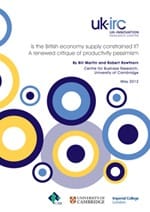 Is this British economy in danger of slipping into a permanent state of stagnation because of failing private sector confidence and weak demand, or is it, as many policy makers believe, constrained by deep-seated structural defects? Despite the weakness of the economy, the Office for Budget Responsibility (OBR) reckons that national output was only 2.5 per cent below the economy’s potential at the end of last year. A new research report published today challenges the view of supply-side pessimists like the OBR and argues that the economy is suffering from a self-perpetuating effective demand failure.
Is this British economy in danger of slipping into a permanent state of stagnation because of failing private sector confidence and weak demand, or is it, as many policy makers believe, constrained by deep-seated structural defects? Despite the weakness of the economy, the Office for Budget Responsibility (OBR) reckons that national output was only 2.5 per cent below the economy’s potential at the end of last year. A new research report published today challenges the view of supply-side pessimists like the OBR and argues that the economy is suffering from a self-perpetuating effective demand failure.
The report, Is the British Economy Supply Constrained II? A Renewed Critique of Productivity Pessimism, by authors Bill Martin and Bob Rowthorn of the Centre for Business Research (CBR), follows two previous reports by Bill Martin, in April 2010 and July 2011. The new report brings fresh evidence to bear on the reasons why Britain’s labour productivity has fallen short and whether the economy’s capacity has been left severely impaired by the banking crisis.
The authors strongly challenge consensus estimates of the size of the economy’s spare capacity; the OBR’s estimate of the cyclical component of the budget deficit, and more generally the belief of supply pessimists that capacity constraints could derail anything more than a modest revival of demand.
Commenting on the research Professor Alan Hughes, Director of the Centre for Business Research at Cambridge and of the UK~IRC, says:
This report shows on the basis of a rigorous and detailed analysis that there is significant scope on the supply side to permit a substantial boost to demand in the UK economy. It is therefore both timely and important in informing the current policy debate and shifting the focus away from austerity and back towards growth.
About the authors
Bill Martin is a Senior Research Associate of the Centre for Business Research at the University of Cambridge. He was a Specialist Adviser in the UK Cabinet Office Central Policy Review Staff (1981-1983) and a Specialist Adviser to the House of Commons Treasury Committee (1986-1997). Between 1983 and 2004, he held senior roles, including that of chief economist, at the investment banking and fund management arms of the Swiss bank UBS.
Robert Rowthorn is Emeritus Professor of Economics and Fellow of King’s College, Cambridge. He is the author a number of academic articles on economic growth, structural change and the balance of payments. His books include, De-industrialisation and Foreign Trade (with John Wells). He has been a consultant to a variety of bodies including the International Monetary Fund, the UN Commission on Trade and Development, and the International Labour Organisation.


